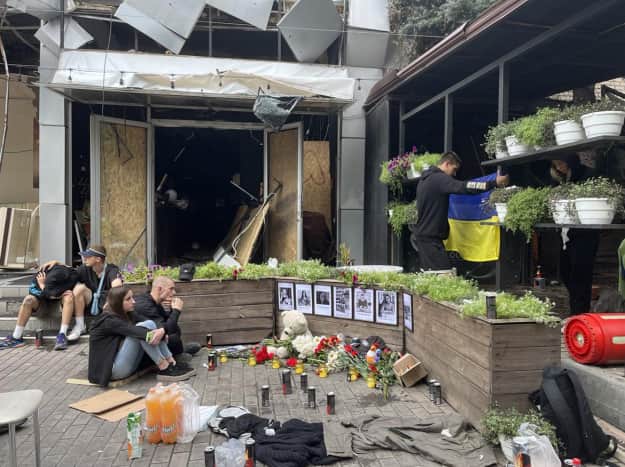On the Iskander missile strike on the Ria pizzeria in Kramatorsk, which claimed the lives of 12 people
From the editor: On 27 June, the Russian military hit the Ria pizzeria in Kramatorsk, Donetsk Oblast, with an Iskander [a mobile short-range ballistic missile produced and deployed by the Russian military]. As of 29 June, about 12 people are known to have been killed and 65 injured. Olha Kyrylenko, a war correspondent at Ukrainska Pravda, and Dmytro Larin, a photojournalist at Ukrainska Pravda, were in the city that day.
That evening felt slightly chilly, after the rain.
An hour and a half before the hit, I was standing on Stus Street [named after Vasyl Stus, a Ukrainian poet, human rights activist, dissident and hero who died in a Soviet prison camp] and thinking about where to go for dinner. I decided I wouldn't go to Ria pizzeria - I would go to Blackbar, which is just across the street. The sun came out and it became warmer.
Forty minutes before the hit, I left Blackbar and went to Yuvileinyi Park.
Advertisement:Between eight and twelve children were playing near a huge Ukrainian flag, which was slightly lowered. Their mothers were comparing Kram [abbreviated from Kramatorsk - ed.] to Kropyvnytskyi (everything in Kram's favour, of course) - they had probably just returned from evacuation. The number of civilians in the city has increased significantly in recent weeks.
Eva [a shop that sells cosmetics, perfumes and healthcare products - ed.] has opened in the shopping centre near our house. You can't buy tickets "for tomorrow" on the Kyiv-Kramatorsk train any more. The children, their mothers, the dogs, soldiers out on an evening run in Yuvileinyi Park - everyone looked happy.
I recorded this moment on video and wrote in my stories: "Everything is as it should be." And a couple of minutes later, I heard a heavy rumble - as if the sky was descending on the city. And a powerful strike, followed by a plume of smoke.
Another strike came 10 seconds later. It was 19:28. Then, as always in Kram, the air-raid siren sounded.
I look at the plume of smoke and think: that was somewhere behind our house, it probably fell on the high-rise buildings - and I run. The internet goes down for a minute or two. Police, rescue workers and medics rush through the streets at top speed.
At the corner of Akademichna and Khmelnytskoho Streets, I realise that the hit was lower down than our house, near the Ria pizzeria. Everything within me pleads with a non-existent god: "Please, just let it not be on Ria itself, let it be somewhere a little off to the side, on the asphalt, just not on Ria." Right now, as always, it will be full of people having dinner: military personnel, journalists, volunteers, civilians.
Children. Children who have just come back from evacuation with their mothers. The internet is breaking through, Dmytro Larin messages to say that our building has been badly shaken, but everything is intact.
I look at the fire blazing in front of me and message Dima back: "Run to Ria with your camera." At the same time, I write in the news chat: "Strike on Kram." A child in a bloodstained blanket is being put into an ambulance in the middle of the street - later I would find out that this child was born in 2022.
Her mum holds her very tightly in her arms. The first wounded people are being carried out of Ria, groaning in pain. Several bloodied waiters who can stand on their feet are being bandaged.
The police put up barriers to hold back all the civilians who are trying to get to Ria. One woman is begging them to let her look for her 20-year-old daughter Yulia, who was just on her shift. Yulia has a small child at home.
"I don't care if I'm buried under the rubble! Just let me go," she's shouting at the policeman, sobbing. He understands, but he has to do his job.
For every person rescued from the rubble, there's a crowd of parents and friends standing there till nightfall, asking if they can "just have a look" to see if this is their child or friend. At 21:14, I see police officers carrying out a dead body in a white bag, and I hope that no one in the crowd notices. Dozens of military personnel, together with rescue workers, are clearing away the rubble.
The crane is humming. It's getting chilly. I argue with all the police and security service officers who won't let journalists do their job: I am furious.
And from time to time I message my mother to tell her I am fine.

*** I leave Ria around 23:00, upload the video and charge the batteries, and at 01:00 I go to the next filming assignment, where we film the other side of this war - the military one - all night and all day. As always, I don't have time to think, to reflect and cry over everything I've seen, but every loss I see with my own eyes hurts me so much.
None of us should die from Russian Iskanders. It shouldn't be this way The man shouting and covering his face with his hands in the video is a waiter who worked at Ria.
Olga Kyrylenko